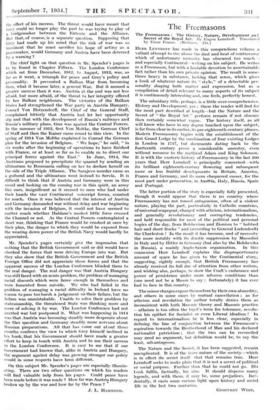The Freemasons
The Freemasons : The History, Nature. Development mini Secret of the Royal Art. By Eugen Lennhoff. Translated by Einar Frame. (Methuen. 21s.) HERE LENNROFF has made in this compendious volume a valiant attempt to rise above the dust and heat of controversy which of unfortunate necessity has obscured too much— and especially Continental—writing on his subject. He writes as a Freemason, but with a laudable devotion to ascertainab1.3 fact rather than his own private opinion. The result is some- times heavy in substance, lacking that sense, which gives a book of whatever nature its "style," of a detectable per- sonality shaping both matter and expression, but as a compilation of detail relevant to many aspects of its subject it is continuously interesting and, one feels, perfectly honest.
The subsidiary title, perhaps, is a little over-comprehensive. History and Development, yes ; these the reader will find for
the most part described at length—but the Nature and the Secret of "the Royal Art" perforce remain if not obscure then certainly somewhat vague. The history itself, as all will know who have in any degree touched upon the subject, is far from clear in its earlier, its pre-eighteenth-century phases. Modem Freemasonry begins with the establishment of the first Grand Lodge by the combination of four existing Lodges in London in 1717, but documents dating back to the fourteenth century prove a considerable ancestry, even without recourse to the mythical Adam and King Solomon. It is with the exoteric history of Freemasonry in the last 200 years that Herr Lennhoff is principally concerned—with its brilliant eighteenth-century flowering and subsequent more or less fruitful developments in Britain, America, France and Germany, and its more chequered career, for the most part under persecution, in Austtia, Italy, Bussia, Spain and Portugal.
The latter portion of the story is especially fully presented, though it would appear that there is no country where Freemasonry has not roused antagonism, often of a violent nature, playing the part, particularly in Catholic countries, of universal scapegoat, charged with atheism, internationalism, and generally revolutionary and corrupting tendencies, and held responsible for most of the political and personal bogies of the day, from Bolshevism and Zionism to "bobbed hair and short frocks" and (according to General Ludendorff) the Charleston ! In the result it has become, and of necessity the more notably with its drastic suppression by Mussolini in Italy and by Hitler in Germany (but also by the Bolsheviks in Russia), a mainly Anglo-Saxon organization. In this connexion Herr Lennhoff explains the disproportionate amount of space he has given to the Continental story, suggesting, rightly enough, that British Freemasonry has already received its full due of attention from other writers, and wishing also, perhaps, to show the Craft's endurance and power of persistence under more adverse conditions than (one need not be a Mason to say : fortunately) it has ever had to face in this country.
The minor charges expose themselves by their own absurdity, and others in some cases by mutual cancellation ; as for atheism and revolution the author totally denies them as inconsistent with both Masonic theory and Masonic practice —atheism is too often the bigot's term for tolerance, revolu- tion his epithet for Socialist or even Liberal idealism! In regard to internationalism he is less clear, especially in defining the line of conjunction between the Freemason's aspiration towards the Brotherhood of Man and his declared nationalist patriotism ; that the two can be reconciled may need no argument, but definition would be, to say the least, advantageous.
The Nature and the Secret, it has been suggested, remain unexplicated. It is of the inner nature of the society—which is in effect the secret itself--that that remains true. Herr Lennhoff seeks to make plain that it is not a secret of political or social purpose. Further than that he could not go. His book fulfils, factually, his aim. It should disperse many legends, and with them, it may be, some prejudices. Inci- dentally, it casts some curious light upon history and social life in the last two centuries. GuorrnEY WEST.






































 Previous page
Previous page